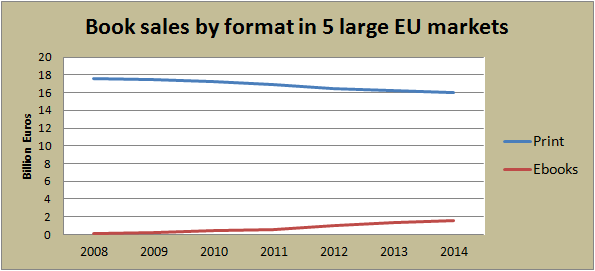Ebooks made a quick breakthrough in countries where English is the dominant language after Amazon introduced the Kindle ereading system. From the beginning, Amazon’s ebook selection was huge, and prices were reasonable. In Europe (apart from the UK), the situation is different: ebooks haven’t gained the same status as printed books. Slowly, but surely the situation is changing in Europe as well, because ebook sales is continuously growing and print books are declining.
EU organization European Parliamentary Research Service has drafted a report that looks at the book market in Europe and possible reasons, such as country-specific taxation policies, for the slow development of ebook markets.

Data source: European Commission, Analysis of the media and content industries: The publishing industry. EPRS report “E-Books: Evolving markets and new challenges”.
The statistic sums up only five EU book markets, but (again, apart from the Great Britain) the trend is clear: ebooks are slowly finding readers, whereas printed books are losing readers. In 2014, the market share of ebooks was about 10%.
What is missing in Europe is the quick quantum leap that took ebooks to a new level in the US around 2010 and 2012. Then, ebooks gained 20-30% share of the book market. Recently, ebooks have taken a step back when the big publishers started controlling ebook pricing.
Why the quantum leap hasn’t happened in Europe? There are many small countries and a variety of languages. Many regional publishers have not made their back catalogue available as ebooks at all. It means that the ebook selection in a small language area may only be a couple of thousand titles. Ebook prices can be almost at the same level with print book prices. Poor selection, poor pricing strategy, and little marketing for ebooks.
The attitudes are changing in Europe. EU is examining ways to tax ebook and print books according to the same principles. Ebook selection is growing and big European publishers are reporting big growth numbers for digital products. One of the largest publishers, Bonnier, recently told that its ebook sales increased 69% in 2015 compared to the year before. The total share of ebooks from the sales in 2015 was 10%.
Just a reminder that books are a huge global business compared to other media businesses. With an estimated value of US$151 billion, books have outdistanced music (US$50 billion), video games (US$63 billion), magazines (US$107 billion) and even film and entertainment (US$133 billion).
